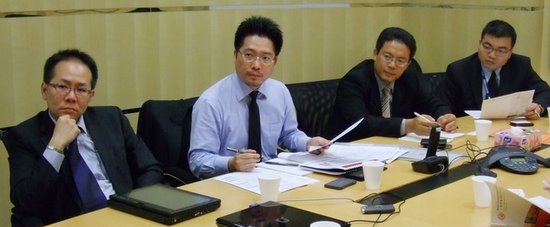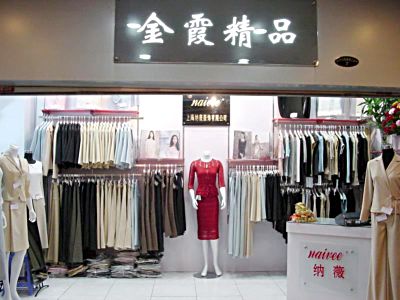
LOCATION, LOCATION, LOCATION… the mantra is drummed into the heads of real estate developers from an early age as the primary determinant of success to a proposed property project.
But Renhe Commercial Holdings Company Ltd takes the slogan to a much deeper level – literally. The company says that competition among retail complexes in China is intense, whether above ground or subterranean, but since it deals with wholesalers, it says the market is less cutthroat.
However, by building civil air defense shelters and using them as underground shopping centers during peace time – (which has essentially been the case in China since the founding of the People’s Republic on October 1, 1949) – the Hong Kong-listed commercial real estate developer believes that is has a distinctive and advantageous business model that has contributed to its position as one of the major apparel and accessories wholesale centers in the cities where its facilities are located.
“Civil air raid shelters are mandatory in high population centers, which is exactly where a wholesale complex wants to be. So this works very very well with our business plan,” a senior executive with the Harbin-based firm told NextInsight, Aries Consulting and a group of Greater China fund managers.
He also said the firm acted as a logistics hub, which made it even more critical to regional economic development in the government’s eyes.
“We also work very quickly. When we excavate below existing urban roadways, we only need to shut down the road for a month. This is much faster than our competitors. Also, being located underground greatly alleviates traffic jams and parking problems of above-ground facilities.”
He said the government considered Renhe a partner of sorts with shared objectives.
And there was no indication that the Chinese government was interested in changing its policy of preferential fiscal measures granted to these “dual-use” developers.
“There shouldn’t be a major policy shift in air shelter approvals,” the executive added.
With its status as a shelter from calamity and a haven for shoppers, Renhe is a decided winner on the cost-saving front by “underselling” the competition, geologically speaking.
As a dual-use facility, the company is not subject to many of the laws, regulations, taxes and policies that apply to the real property industry in China, and Renhe is not subject to land use right premiums and land appreciation taxes.
The company is also currently exempted from property taxes under PRC laws and regulations which enables it to develop its projects at very competitive costs.
“And by building our shopping centers underground, we gain access to prime commercial areas in cities in which we operate where the land supply above-ground is limited,” he said.
The executive said Renhe conducted extensive market research and feasibility studies before actually picking up a shovel and digging.
“We engage in market analysis, site selection, project planning and supervision, leasing and transfer of operation rights of shop units and the provision of shopping center management services.”

Relatively decoupled from housing volatility
Investors in China’s residential real estate market have been unwilling passengers on a rollercoaster of a ride these past couple of years thanks to tremendous volatility in the country’s housing sector.
Somewhat exacerbating the situation for both residential property developers and the shareholders of their listed stock are intermittent government schemes to intervene in pricing mechanisms by, for example, mandating that 75% all newly-build residential units must be 90 square meters or less, thus ostensibly providing more roofs over more middle class heads.
But due to the nature of Renhe’s business – purely a commercial property play – the company is relatively immune from the more pronounced volatility in the housing sector.
Renhe, which listed in October 2008, is principally engaged in developing, managing and leasing underground shopping malls, with other activities including investment holding.
And the company was spread across China, thus minimizing overexposure to the possibility of regional bubbles and busts.
“We mainly sell to wholesalers, so the residential property market doesn’t really affect us. In fact, we believe the A-share property stocks should see bubbles this year,” he said, with most of the counters heavily weighted in the homebuilding side of things.
Renhe has projects in many provinces across the country, but you might not know it from looking out your car or bus window.
At present, Renhe operates underground shopping centers in Harbin, Guangzhou, Zhengzhou and Shenyang with total gross floor area (GFA) of 330,660 square meters.
Its Guangzhou project has an aggregate planned GFA of nearly 100,000 sq m, with Phase I of 48,000 sq m completed and Phase II of equal size planned for this year.
“We also have two projects under operation in Zhengzhou and Shenyang, and nine projects for future development in Harbin, Guangzhou, Wuhan, Zhengzhou, Tianjin, Nanchang and Shenzhen with a total aggregate GFA of over 1.4 mln sq m,” he said, rattling off a list that essentially runs uninterrupted from the country’s northeast to its steamy south.
Renhe also obtained approvals for project proposals from the National Civil Air Defense Office for the commercial development and operation of the underground defense shelters that are completed, under development and for future development including those for phases IV and V of the Harbin project, the Wuhan project and the Nanchang project with aggregate GFA of nearly 314,000 sq m which have been granted to Renhe.
“All of our projects have easy access to transportation hubs such as subway stations, railway stations, city bus stops and inter-city bus terminals.”
He was candid with us, saying that of course not all of the cities it operated in were shopping meccas, but that its tremendous ability to minimize costs put it at a unique strategic advantage vis-à-vis its domestic competitors, in both the above ground sector as well as where the sun doesn’t shine.
“We got a very good deal up in Shenyang,” he said.
Since its listing last year, the company’s unique location in the underground space has intrigued many an analyst, and there is no shortage of coverage for this counter.
“Currently, UBS, Morgan Stanley, BOCI, Merril Lynch, CITIC International, China Everbright, CCB International and HSBC cover our company,” he added.
And the welcome attention was only likely to increase over time, as Renhe had no intention of resting on its laurels. It was always on the lookout for new projects that fit into its business model.
As proof of this, last month the board announced Renhe had entered into six sale and purchase agreements with independent vendors for the purchase of the operation rights of underground shopping centre sites in the PRC: Dalian Property, Daqing Property, Harbin Property, Weifang Property I, Weifang Property II and Weifang Property III and each of them was acquired at a consideration of approximately 32 mln yuan, 77.153 mln yuan, 265 mln yuan, 50 mln yuan, 350 mln yuan and 60 mln yuan, respectively, which will be satisfied by the group’s further equity financing or internal resources.
“Upon the completion of the property acquisitions, the group intends to continue to develop and operate the underground shopping centre sites at the above locations in addition the current portfolio of projects. In addition, Renhe has also entered into memoranda of understanding with certain potential vendors to acquire operation rights of four more project sites located in Dalian, Harbin and Weifang,” the company statement said.
It added that given the satisfactory results achieved thus far in promoting the “First Tunnel” brand for Renhe’s currently operational projects, it is dedicated to establishing a nationwide network of underground wholesale markets unified under the “First Tunnel” brand name.
“As a result, acquisitions of the operation rights of the underground shopping centres sites in strategic cities such as Dalian, Daqing, Harbin and Weifang would further Renhe’s objective in this aspect.”

